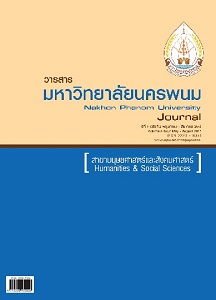การศึกษาเพื่อพัฒนาจริยธรรมของนักศึกษาด้วยกระบวนการอภิปัญญา
Main Article Content
Abstract
สภาพสังคมปัจจุบันให้ความสำคัญกับค่านิยมที่เปลี่ยนไป จากการสอนลูกให้เป็นคนดีกลายเป็นต้องการให้ลูกเป็นคนเก่ง และคนรวย เพื่อความสุขสบายในอนาคตเห็นได้ชัดว่าวัยรุ่นไทยขณะนี้ขาดจิตสาธารณะ ห่างเหินศาสนาและความซื่อสัตย์ เพราะเด็ก ถูกหล่อหลอมจากครอบครัวที่เน้นเรื่องการเรียนเป็นหลักซึ่งเป็นสิ่งที่ทำให้พ่อแม่พอใจ เยาวชนไทยจึงเป็นเด็กที่มุ่งเน้นแต่การพัฒนา ตนเองให้เป็นคนเก่ง แต่ไม่มีจิตสาธารณะ การขาดจริยธรรมทำให้เกิดปัญหาสังคมในระดับต่างๆ ตามมา และเพื่อให้เยาวชนมีความเข้าใจ ในการใช้ชีวิตอย่างมีคุณธรรมจริยธรรมซึ่งถือว่าเป็นคนที่สมบูรณ์แบบทั้งความรู้และจริยธรรมจึงถือเป็นภาระหน้าที่ของสถาบัน การศึกษาซึ่งมีบทบาทและความสำคัญในการสนับสนุนและพัฒนาจริยธรรมให้แก่เยาวชน โดยจัดการเรียนการสอนสร้างสิ่งแวดล้อม และบรรยากาศในการกระตุ้นให้เกิดคุณลักษณะที่พึงประสงค์ของนักศึกษา จริยธรรมสามารถพัฒนาได้โดยการจัดสภาพการพัฒนา จริยธรรมให้เหมาะสมกับช่วงวัย เพราะจริยธรรมเปรียบเหมือนอภิปัญญา การเรียนรู้อย่างมีความหมายมีความเหมาะสมและ ส่งผลโดยตรงได้กับวัยของนักศึกษา เนื่องจากนักศึกษาเป็นวัยที่สามารถเข้าใจสิ่งที่เป็นนามธรรม สามารถคิดไตร่ตรอง ตระหนักถึง ผลกระทบ และมองเห็นความสำคัญของการปฏิบัติตนเป็นคนมีจริยธรรมอย่างชัดเจนทำให้เกิดการปฏิบัติอย่างเข้าใจ อันจะส่งผล ให้เกิดพฤติกรรมการจัดระบบความคิด การควบคุมกำกับพฤติกรรมของตนเองให้เป็นผู้มีจริยธรรม การรู้จักวางตนเอง ตลอดจน ปรับเปลี่ยนพฤติกรรมและพัฒนาคุณลักษณะการเป็นผู้มีจริยธรรมที่คงทนถาวรซึ่งเป็นคุณลักษณะของการเป็นคนที่สมบูรณ์และ เป็นทักษะที่การศึกษาในศตวรรษที่ 21 ต้องการ
Hoksuwan The current state of society stresses the importance of the changing values, such as the way of teaching children. The children who used to be taught to become a good person are now taught to excel and become rich in order to be happy with their life in the future. It is obvious that Thai teenagers nowadays lack the public mind. They are distant from religion and honesty, and have been molded from their family into mainly focusing on their own study which makes their parents satisfied. Thai teenagers only focus on developing themselves to be smart without having the public mind. Being unethical yet results in social problems at all levels. In order to make them understand how to spend their life ethically for becoming a perfect person both in knowledge and ethics, it is the responsibility of educational institutions whose role and importance are to promote and develop ethics to the youth through the provision of instruction and creation of environment and climate which are able to encourage the desirable characteristics in them. Ethics can be developed through managing the students’ ethical development condition that is appropriate to the students’ age. Thus, ethics is comparable to metacognition of meaningful learning which is suitable and directly affects students in their age. Because of their proper age of being able to understand abstract things, ponder, realize the consequence of action and see the importance of visible and ethical self-practice, the students’ practice is done comprehensibly leading to having their behavior in organizing a thinking system, having their self-behavior controlling and directing to be an ethical person, knowing how to behave themselves as well as adjust their own behavior, and developing their ethical characteristics which are the qualities of being a perfect person and the desirable skills needed by the twenty-first century academia to be permanent.


